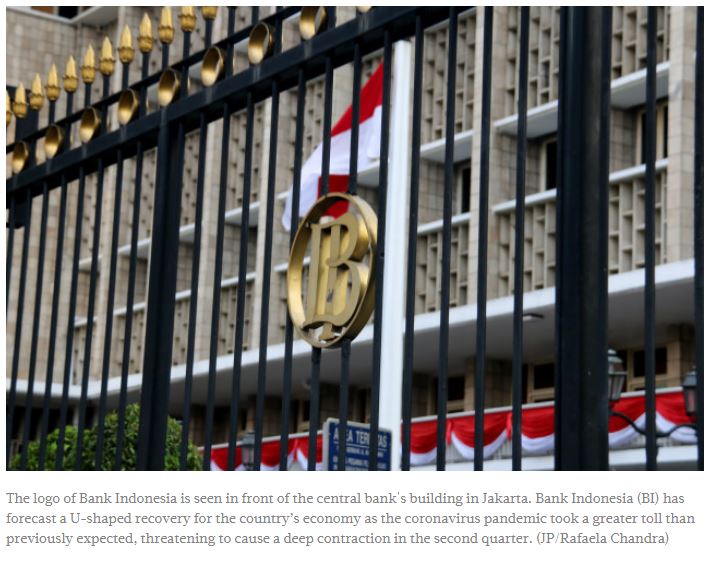Bank Indonesia projects 4.8 percent contraction in Q2, U-shaped economic recovery
Bank Indonesia (BI) has forecast a U-shaped recovery for the country’s economy as the coronavirus pandemic took a greater toll than previously expected, threatening to cause a deep contraction in the second quarter.
Indonesia‘s economy could shrink between 4 and 4.8 percent in this year’s second quarter, BI senior deputy governor Destry Damayanti said on Monday, adding that the recovery would be slower than expected as COVID-19 cases continue to rise around the country.
During the early period of the outbreak in Indonesia, the central bank and the government said they expected the economy to see a V-shaped recovery.
The central bank predicts “a U-shaped recovery because the number of coronavirus cases continues to increase and has not reached its peak,” Destry said during an online discussion, adding that the reopening of the economy would make it harder to keep the number of cases contained.
Indonesia’s recorded number of COVID-19 cases surpassed China’s official tally on Saturday before the country logged its highest daily death toll on Sunday.
Destry said fears of a prolonged global economic downturn had also put pressure on emerging market assets, hitting the rupiah exchange rate as investors steered away from high-risk assets in favor of safe-haven assets.
The rupiah depreciated 0.78 percent to Rp 14,817 against the US dollar as of 12:00 p.m. Jakarta time on Monday, losing around 2.5 percent of its value since the beginning of last week.
The central bank cut its benchmark interest rate for the fourth time this year to 4 percent last week to bolster the economy and reasserted its commitment to a bond-buying program worth US$40 billion to rescue the economy and reduce the government’s debt burden.
Meanwhile, the government has allocated Rp 695.2 trillion ($47.35 billion) in stimulus to bolster the economy, and expects the budget deficit to reach 6.34 percent this year. It also expects the economy to shrink 0.4 percent this year under a worst-case scenario or grow 1 percent in a best-case scenario, with the economy tipped to contract 3.8 percent in the second quarter.
University of Indonesia economist Chatib Basri said the government would need to bolster cash transfers to lower-middle income citizens to revive consumer demand and spending, and called on the government to step up its fiscal response to jump start the economy.
“The government needs to bolster consumer demand by providing cash transfers, which in turn will boost the supply side of the economy,” said Chatib.
Private spending contributes more than half of Indonesia’s gross domestic product (GDP), followed by investment and exports.
Institute for Development of Economics and Finance (Indef) economist Aviliani also pushed the government on Friday to move more quickly in disbursing stimulus funds and boosting social aid expenditure to stimulate demand.
“With the Indonesian economy mainly driven by private consumption and domestic demand, we expect the COVID-19 shock on domestic employment and income levels to cause a significant drag on the economy over 2020,” researchers at Fitch Solutions wrote in a note, expecting the economy to shrink 1.3 percent this year given the continued surge in virus cases.
Fitch expects a low inflation environment and stable rupiah outlook to provide room for the central bank to focus on supporting the economy, and expects the central bank to cut its benchmark policy rate to 3.75 percent by the end of the year.
Source: https://www.thejakartapost.com/news/2020/07/20/bank-indonesia-projects-4-8-percent-contraction-in-q2-u-shaped-economic-recovery.html


 English
English




